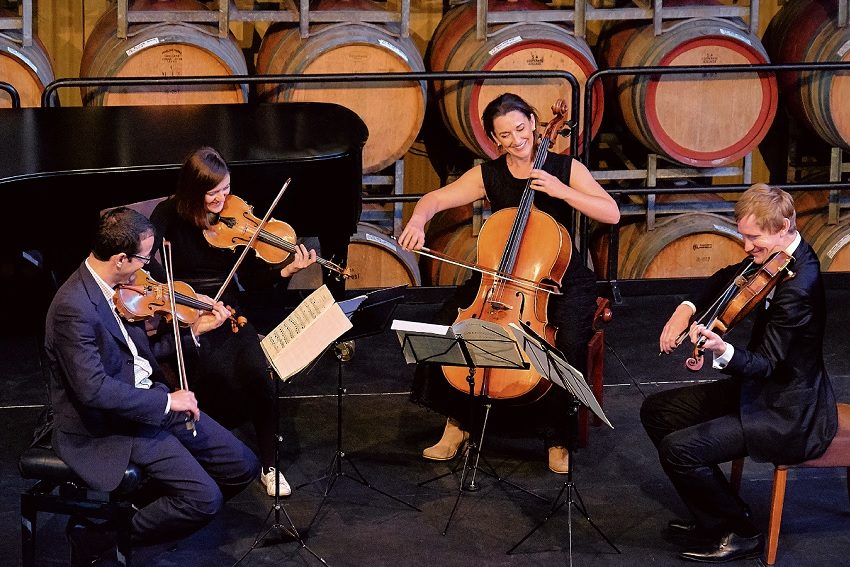Rite of Spring to quake the southern vales for Coriole Music Festival

Smaller festivals are not usually in the habit of forking out international airfares to bring in artists but Coriole Music Festival has something and someone special in mind for its upcoming event.
Coriole Music Festival’s music director Anthony Steel will fly in one of Moscow’s most outstanding younger pianists to perform at this year’s festival. Andrey Gugnin was winner of the 2016 Sydney International Piano Competition, and Steel wants to pair him with Konstantin Shamray, Adelaide’s own Russian-born star pianist who won the same competition in 2008.
Together these two young guns will play Stravinsky’s The Rite of Spring, arguably the 20th century’s most defining musical work, in its first published version for piano four-hands. Stravinsky wrote this version a year before scoring up the work for orchestra and unleashing it on an unsuspecting public in 1913, and famously he played it with Debussy taking the bass register and himself the upper parts — now what a moment in history that must have been.
Steel loves Stravinsky. There is something about his music’s astringency and iconoclasm that resonates with him, and it comes as no surprise that this famous piece of ballet music forms the centrepiece of this year’s program. With its untamed rhythms and crashing climaxes, it looks bound to stir up Coriole’s barrel hall.
“The piano version might not begin as memorably as the orchestral version, but it gains terrific force by the end,” Steel says.

His interest in the Russian composer has been lifelong but was helped by seeing him conduct in the 1960s at the Royal Festival Hall at London’s Southbank Centre, where he worked as its first planning manager before coming to Adelaide in 1972.
“He was a celebrity by then. While he was not a memorable conductor, and while he perhaps realised by that stage that he wasn’t so good at conducting, it was exciting to see him of course,” Steel recalls.
Only once before has Coriole programmed any music by Stravinsky, and this was in 2005 when Michael Kieran Harvey played three dances from Petrouchka. Steel plans to redress that in good measure. He added the Three Pieces for String Quartet at the suggestion of Adam Chalabi, Tinalley String Quartet’s first violinist. Adam also agreed to play the Duo Concertant for violin and piano. Terse, playful off-beat rhythms play a big part in both these works.
“That’s what I like about them. The rhythm goes completely crazy,” Steel says.
In addition, Shamray will conduct a seven-piece ‘Coriole Ensemble’ in Stravinsky’s jazz-inspired theatre work, The Soldier’s Tale. Steel fondly remembers “a wonderful production of that with seven-foot high puppets” that he programmed at the Southbank Centre, again in the ‘60s. “It was probably the first time the Queen Elizabeth Hall had ever been used for music theatre, and since then of course it became the place for such ventures.”
In directing Coriole for a fourth time, Steel has deliberately continued the festival’s long honoured multi-layered approach to programming. Several themes are present, broadly illustrating the tensions between Romanticism and modernism. Bach figures prominently as another ‘constructivist’ composer in excerpts from his Art of Fugue, which are played alternately by Tinalley Quartet and Gugnin, and in two of his motets sung by The Choir of St James’, who are coming over from Sydney.

Then there are the glorious Kinderszenen and Liederkreis song cycle of Schumann, with young baritone Daniel Carison joining Gugnin in the latter, Brahms’s Piano Quintet in F minor, Bartok’s First String Quartet, Strauss’s Metamorphosen with extra string players from the ASO, together with some rarely heard songs by Poulenc, again with Carison. “I think they’re wonderful,” Steel enthuses.
Mark Lloyd, Coriole Vineyard’s general manager, admits there are “big numbers” involved in this festival that makes logistics more challenging. However, he maintains that the focus as always is on how the weekend provides audiences with “different experiences gained from having a large number of performers present and music that we don’t always get to hear”. This combination, he suggests, is what audiences have come to admire and have pushed visitation rates from interstate to around 25 per cent each year.
Lloyd describes himself as “not a particular fan of Stravinsky at this stage” but adds smilingly that “this is bound to change over the course of the three concerts”.
A new change this year is a commission for a new chamber work to be announced during the festival. This will be just the second time Coriole has commissioned a new work; the last time was in 2010 with a string quartet by Ian Munro.
The festival’s corporate structure also changes this year by becoming part of the newly established McLaren Vale Music Festival Association. This move is expected to ensure its longevity and will pair it alongside another musical event in the region, Big Sing McLaren Vale. A community fixture that began in 2017, it continues this year with Fauré’s Requiem under conductor Luke Dollman with the additional strength of the Elder Conservatorium Chorale and Elder Conservatorium Orchestra. Anyone can register.
Coriole Music Festival McLaren Vale
Saturday, May 5 to Sunday, May 6
coriolemusicfestival.com